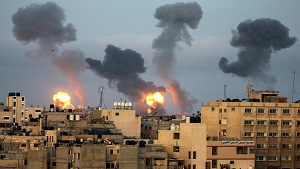The US Agency for International Development contract was intended to resupply DRC's war-ravaged eastern provinces for the year, and left thousands of health centres without provisions when fighting escalated. The State Department, which manages United States Agency for International Development (USAID), did not respond to repeated requests for comment by email and text message.
Reuters spoke to officials at the UN and four other aid groups that treat rape survivors in eastern DRC for this story. A team also visited a site in South Kivu province to speak directly to healthcare workers and survivors.
"When you look into the eyes of a rape victim, you get the impression that her gaze is dead," one health worker in DRC, who declined to be named for fear of reprisals, said. "You never forget standing in front of that person and telling them that you don't have any medicine, that you don't know how to help them, and asking them to leave."
Rwanda-backed M23 rebels swept across the east of the country in January, seizing two major cities, in an escalation of a decades-long conflict. The UN has said that some 67 000 incidences of rape have been recorded since then with many more likely going unreported.
Sexual violence as a weapon of war in the DRC has been documented by generations of UN experts and aid groups.
PIPELINE DISRUPTED
Trump ordered a 90-day pause on foreign aid after taking office in January and halted grants by USAID.
USAID's contract with a supplier for the kits was in the pipeline when billionaire Elon Musk, who at the time was spearheading a department to improve US government efficiency, said he was shuttering the agency in January.
According to the UN and other aid organisations, USAID immediately cancelled the contract, which would have resupplied thousands of health centres by March. Reuters has agreed not to name the supplier to avoid compromising its sensitive operations in DRC.
"When USAID decided to terminate the large funding they had for this American Non-Governmental Organisation (NGO), this American NGO immediately stopped all activities," said Noemi Dalmonte, the deputy representative in Kinshasa for the UN Population Fund (UNFPA). "The pipeline got disrupted at a very unfortunate time."
The post-rape kits come in a box containing HIV medication to prevent infection within 72 hours, antibiotics and testing for sexually transmitted diseases and emergency contraception. The supplies paid for by USAID were meant to reach over 2 000 facilities.
“This kit is truly important to reassure the woman who has been really traumatized that she won't get AIDS, that she won't have an unwanted pregnancy, and that she won't contract venereal diseases,” said Amadou Bocoum, the Country Director of CARE International.
The UNFPA shared a document with Reuters that indicated that only seven out of 34 health zones in North Kivu have a minimal supply of post-rape kits left. Less than one-in-four survivors' needs are currently being met. Only 13% of survivors that request help receive medication to prevent HIV within the recommended 72-hour window.
While the US State Department has said it will continue to support life-saving programs worldwide, the contract to supply post-rape kits to survivors remains cancelled.
Trump has said that the US pays disproportionately for foreign aid and he wants other countries to shoulder more of the burden. The US disbursed $65 billion in foreign assistance last year, nearly half of it via USAID, according to government data.
The UNFPA and other aid organisations are trying to raise around $35 million to cover the loss of funding from the US from donors such as the Gates Foundation and other Western nations.
The consequences of the cancellation include survivor deaths, the spread of HIV, unwanted pregnancies, and unsafe abortions with high maternal-mortality risk, the UNFPA document said.
--Reuters--













